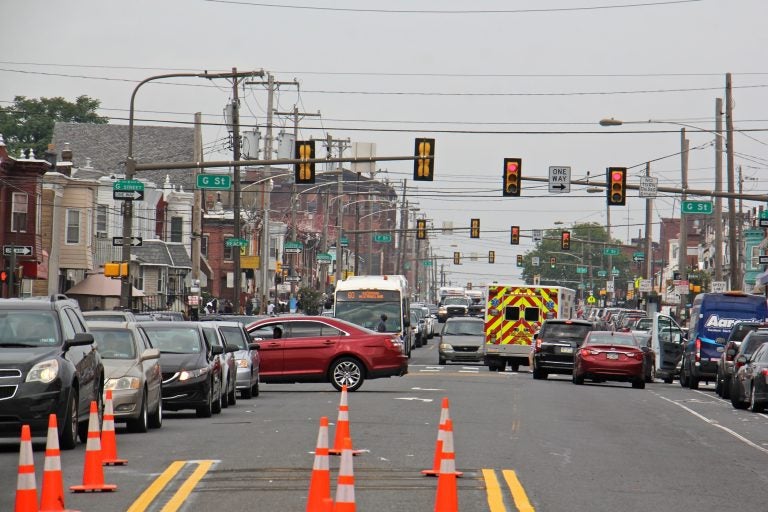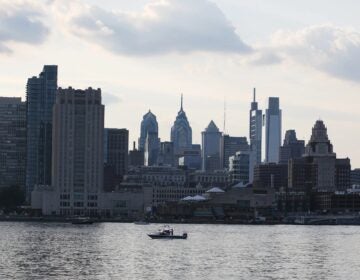So what’s the climate change/asthma connection?
Warming temperatures worsen ozone pollution. Excess carbon dioxide (a greenhouse gas) causes plants to grow faster and release more pollen — extending the “allergy” season.
Listen 8:46
People with asthma in Philadelphia say air quality is a major problem. (Emma Lee/WHYY)
Jefferey Colter was diagnosed with asthma when he was 11, and, even as an adult, he often suffers asthma attacks and ends up in the emergency room when the seasons change.
“You’re breathing fine and everything, [but] right now I’m going through hell,” Colter says. “I can barely breathe, and … I’d rather be home right now on some medications or something, trying to get my lungs open up so I can breathe. But I got a mortgage, I got kids, I got bills I got to pay, so I have to come to work on 50 percent.”
Each ER visit costs about $500, he says.
“It is a very hard task to deal with asthma. Like I said, I barely get any sleep. I’m tossing and turning, waking up from asthma,” Colter says.
Another issue for him is mold.
Colter is an instructor with an energy conservation nonprofit called the Energy Coordinating Agency, and he helps people retrofit their houses to save money on energy. Running into mold is a risk at his job.
He was in a client’s basement once and could barely breathe.
“And the lady said, ‘What’s wrong?’ and I said, ‘You have mold down here because it’s killing my lungs right now.’ I felt for whoever had to stay in that house that didn’t have asthma that’s potentially going to have it because they’re living in this,” Colter says.
Asthma can be difficult and expensive to address.
More than 26 million people in the U.S. have it, according to 2016 data from the Centers for Disease Control and Prevention.
And some public health experts say climate change could make their asthma even harder to deal with.
More carbon dioxide means plants grow faster. Research shows that plants like ragweed and pine trees could release pollen sooner, and release more of it, leading to a longer pollen season. Warming temperatures also exacerbate air pollution and contribute to ground-level ozone.
Pediatrician Tyra Bryant-Stephens says we shouldn’t think of asthma as an individual medical problem, but rather more as a societal problem to be addressed on a bigger scale.
She’s been treating children with asthma for more than 20 years, and she realized one thing that could help: major home repairs.
“When we see them in the hospital and we discharge them to homes that are deteriorating, we are really discharging them to the triggers that sent them to the hospital to start with,” she says.
Bryant-Stephens is medical director and founder of the Community Asthma Prevention Program at the Children’s Hospital of Philadelphia. Her program started offering home repairs along with their existing home visit program last year.
Ali Kenner, an assistant professor of politics at Drexel University, says some public health researchers are looking at an even bigger picture, citing a 2016 report from the U.S. Global Change Research Program.
“Asthma is really about atmosphere … It’s not just about what’s happening in the individual body, but it’s about what we are breathing, and our breathing spaces are collective,” Kenner says.
Kenner has been studying the experiences of people with asthma since 2009 and recently wrote a book called “Breathtaking: Asthma Care in the time of Climate Change.”
“Climate change is really pushing the issue here. Historically, at least since the 1980s when the asthma epidemic emerged here in the U.S., public health researchers, caregivers, doctors, have talked about addressing asthma in terms of triggers. These are singular things: mold, pollen, dander, air pollution, cold air, exercise … but those aren’t really how we live. We don’t live through singular things,” she says.
Kenner hopes her work will get policymakers to pay attention and push them toward stricter regulations around air quality and air pollution.
“We need to make it politically feasible … We’re talking about public health, and if you look at the research on the public health impacts of air pollution, it far exceeds asthma alone. We’re talking about different health conditions that are implicated by outdoor air pollution,” she says.
WHYY is your source for fact-based, in-depth journalism and information. As a nonprofit organization, we rely on financial support from readers like you. Please give today.







